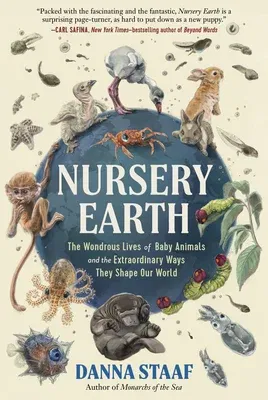From the author of Monarchs of the Sea, a first-of-its-kind journey
into the hidden world of baby animals--hailed as "a gobsmacking
delight!" (Sy Montgomery, New York Times-bestselling author of The
Soul of an Octopus)
It's time to pay attention to baby animals. From egg to tadpole, chick
to fledgling, they offer scientists a window into questions of immense
importance: How do genes influence health? Which environmental factors
support--or obstruct--life? Entire ecosystems rest on the shoulders (or
tentacles, or jointed exoskeletons) of animal babies. At any given
moment, babies represent the majority of animal life on Earth.
In Nursery Earth, researcher Danna Staaf invites readers into the
sibling (and, sometimes, clashing) fields of ecology and developmental
biology. The tiny, hidden lives that these scientists study in the lab
and in the wild reveal some of nature's strangest workings: A salamander
embryo breathes with the help of algae inside its cells. The young grub
of a Goliath beetle dwarfs its parents. The spotted beak of a parasitic
baby bird tricks adults of other species into feeding it. Mouse embryos
can absorb cancerous cell grafts--and develop into healthy adults.
Our bias toward adult animals (not least because babies can be hard to
find) means these wonders have long gone under-researched. But for all
kinds of animals, if we overlook their babies, we miss out on the most
fascinating--and consequential--time in the lives of their species.
Nursery Earth makes the case that these young creatures are not just
beings in progress but beings in their own right. And our planet needs
them all: the maggots as much as the kittens!

